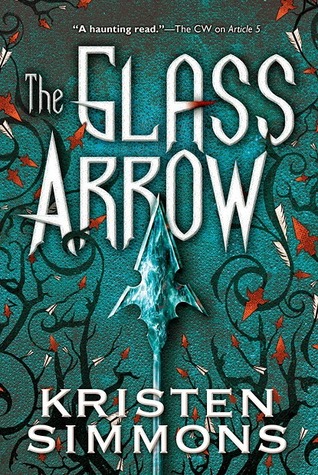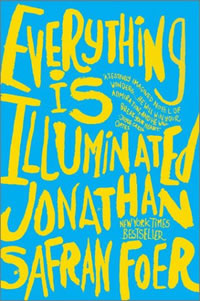
When I'm reading books that feature strong female characters, I have two real pet peeves that seem to surface more often than they should: when romance completely hijacks an otherwise interesting story, and when one seemingly isolated event ends up toppling an entire paradigm. Because honestly, are you really that worried about who's going to take you to prom when the world's about to implode? And while one person can become the face of a revolution (I'm looking at you,
Katniss Everdeen), one woman escaping from a prison or work camp doesn't immediately reduce the patriarchy to a smoldering heap.
Kristen Simmons, who is also the author of the Article 5 series, managed to avoid both of those pitfalls in her latest book,
The Glass Arrow. It's a cross between
The Handmaid's Tale and
The Maze Runner, as unlikely as that sounds, with main character Aya at the epicenter. She's been raised by her mother, along with two young orphans named Tam and Nina, in the wilds far away from the city of Glasscaster. Inside the city walls men rule all, and women are nothing more than commodities to be bought and sold for breeding. When Aya is captured and brought to Glasscaster to be sold, she enters this hopeful world of enslavement as a valuable commodity, since her upbringing in the wilds makes her naturally more fertile than city-bred women. But she won't make it easy for her captors to sell her, using every opportunity to attempt escapes and pick fights with the other girls around her. Perhaps, if she can make herself more trouble than she's worth, Aya can find her way back out to her family.
But eventually Aya can no longer escape being sold. Before she's locked away permanently in a glamorous prison to await her life as breeding stock, she has one last desperate chance to escape Glasscaster and find what's become of her family. In order to do so, she'll have to rely on the only friends she's made in the city: a mute horsemaster, a catty girl named Daphne, and an orphaned wolf pup. It's a strange assemblage of protagonists that make up our group of heroes in this dystopian young adult novel.
Simmons is an unapologetic feminist writer, which is reflected not only in the story as a whole but in details like how Aya rebels against things like being shaved and plucked just to conform to the standards of beauty held in the city. While this is a great "you're okay the way you are, be strong in yourself" message to send teenagers of any gender, I felt like it was really overdone in this particular book. Aya's entire existence narrows into the sentiment of rebellion in pursuit of her escape, even leading her to do ridiculous, clearly hopeless things like attack her armed and biologically enhanced guard with her bare hands, or tear her own clothing before being presented to potential buyers.
While the absolute nature of the society Simmons created was an interesting setting in which the story could unfold, with women having no power and Aya being able to subvert that, it also provided the unfortunate opportunity for every little encounter to be a life-or-death situation. I felt like I got adrenaline fatigue about half way through the book from all Aya's harrowing attempts at various things, so that when the real climax arrived I wasn't as primed for it as I felt I should have been.
One thing that I did really appreciate about this otherwise too-over-the-top novel though was the fact that Aya's goal wasn't to topple society and its errant ways or end the subordination of women everywhere; she just wanted to get home. She wanted to get herself out and away. That's it. And her story's outcome had no obvious ramifications toward that end, either; it was purely her tale. There is no planned sequel for
The Glass Arrow either, so if you'd like to see Glasscaster fall, you can write your own preferred continuation after you finish the book.
The Glass Arrow by Kristen Simmons was released on the 10th of this month and can be purchased now at your favorite local, independent bookstore.

